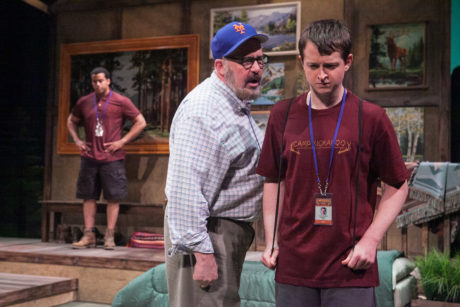You know you’ve just seen a play that hits a nerve about the distress of parents who have a troublesome, troubled son (whom they love but don’t know how to cope with) when you’re reading the paper the next morning and there’s an advice column about that very dilemma: “We’re close to tossing him out,” a distraught parent writes.

Coincidentally in Anna Ziegler’s play Another Way Home (just opened at Theater J in a terrific production smartly directed by Shirley Serotsky), a 50-something Manhattan attorney named Philip (Rick Foucheux) reaches a point of exasperation with his difficult son Joey (Chris Stinson) such that he abruptly yells at him, “Get lost”—whereupon the boy does so, literally disappearing, thereby terrifying Philip and his wife Lillian (Naomi Jacobson) that their son is gone for good.
The scene of this harsh confrontation is a summer camp in Maine, as picturesque as a postcard in Paige Hathaway’s scenic design, bathed in Harold F. Burgess II’s bucolic lighting. It’s a place to which well-off parents send their city kids to enjoy the great outdoors—a place that’s really really meant to be very very happy. (I assume the camp’s name, Camp Kickapoo, is a wry reference to Kickapoo Joy Juice, the fictional drink featured in Li’l Abner comics.)
Philip and Lillian have shown up on Parent’s Day to visit their son, and Joey is not at all pleased to see them. He’s recalcitrant, belligerent, and wracked by adolescent angst (which Stinson plays so convincingly you might well ask, Is there a therapist in the house?). The boy lives under a dark cloud of prevailing unhappiness.
PHILIP (to the audience)
Joey isn’t an easy kid. We love him; we cherish him, but he isn’t an easy kid.
LILLIAN
Lots of learning “issues.” Lots of social “issues.” First they said it was ADD, then ADHD, then autism. Then it was a mood disorder, then an anxiety disorder, then oppositional defiant disorder, and most recently: depression. His diagnoses change as much as he does.

By contrast Philip and Lillian’s daughter Nora (Shayna Blass) is a brainy, trouble-free teen who’s bright as daylight. (Blass’s scenes are mostly in Nora’s small bedroom, which is set apart stage left, and her endearing portrayal, like when she sings hilariously a Taylor Swift song, pretty much stops the show each time she’s on.)
Coincidentally, the parents seeking advice in that newspaper column I happened upon also had a daughter who’s no problem. Apparently there’s something in the zeitgeist that Ziegler gets.
Another Way Home plays like a domestic comedy just in rustic surroundings. Funny lines. Snappy cracks. And never more so than when Philip and Lillian address the audience directly—which Foucheux and Jacobson do like a team of seasoned raconteurs who share the same pulse. The way Ziegler has scripted this long-married couple is kind of conventional but seems thoroughly fresh in Foucheux’s and Jacobson’s assured hands.
Philip’s and Lillian’s anxieties over Joey’s well-being have frayed their relationship, but as Ziegler makes clear, they have other marital tensions not attributable to their son. Among them is Philip’s obsessive sexual interest in watching a particular a ballerina on stage, a past circumstance that prompted Lillian to realize that though she loved him, “I would never know him.”
That becomes true of Philip and Lillian’s relationship to Joey as well: They love him but cannot know him. And during the course of the play, they come reluctantly to accept the limits of their loving:
LILLIAN
You want your child to be happy. It’s all you want.
PHILIP
You think you can provide happiness and then you realize you can’t.
In a recent Q&A Director Serotsky underscored that theme,
the anguish parents Philip and Lillian experience over the realization that—for all that they can provide their children—they cannot make them happy. That no amount of money can purchase joy, or acceptance, or a sense of purpose, or meaningful relationships, or an ease about moving through the world.
But as Another Way Home progressed, I sensed another theme going on as well, something Ziegler seems to have inserted almost surreptitiously inside her play, something quite insightful about race and class. The tipoff is how Ziegler has incorporated the character of Joey’s camp counselor Mike (who is played by Thony Mena with phenomenal presence—unassuming, deceptively understated, yet like a significance depth charge).
Mike is not upper-middle class. He doesn’t have a well-off solicitous mom and dad like Joey. He was raised by his grandmother, in a house across the lake. A few years older than Joey, Mike has grown up to be smart, stable, and talented, and now a student at Vassar. (Mike’s ethnicity is not specified in the script, but see my interview with Shirley Serotsky for a fascinating discussion of how casting an actor of color to play the part enriched the play.)
Joey and Mike have a scene together near the end, and in it Mike tells Joey that he would have really been happy to have had parents like Joey’s. The scene is not long, it goes by fast, but it was the most moving in the play. It shows in stark relief that Joey’s unhappiness, including the parents he insolently complains of, is due to more than any diagnosis; it’s about privilege he takes for granted.
LILLIAN
Is he Mexican? Or…Filipino? I mean, you just can’t tell with some people. But he has the most lovely piercing eyes. As though he could see right through all the bullshit.

Ziegler doesn’t really sustain what transpires in that scene; it’s somewhat mortised in. And in fact the whole play is premised on the family’s unquestioned and unexamined privilege—all of which makes this show comfortable and entertaining. But tucked inside all the humor, in the character of Mike and his interactions with Joey, is a race and class lens on happiness that could set kindling on fire.
Ultimately a remarkable mix of very funny and seriously astute, Theater J’s Another Way Home is well worth leaving home for.
Running Time: Approximately 80 minutes, with no intermission.
Another Way Home plays through July 17, 2016 at Theater J at The Washington DC JCC’s Aaron & Cecile Goldman Theater – 1529 16th Street, NW (16th and Q Streets), in Washington, DC. For tickets, call the box office at (202) 777-3210, or purchase them online.





